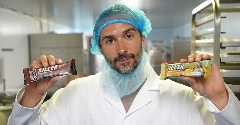News
Are Dutch supermarkets committed to human rights?
3 Jul 2023
Dutch supermarkets lack widespread measures to respect human rights in supply chains, research project Superlist Social's inaugural report finds.
Superlist Social, a multi-year research project that gathers insights on how supermarkets help their customers eat healthy, sustainable and fair food, has released its Superlist Social 2023 report.

Analysing the actions of seven Dutch supermarkets, including Aldi and Lidl, the report found that none of the supermarkets demonstrated far-reaching measures for respecting the human rights of those in their supply chains. The research states the supermarkets have yet to properly safeguard human rights in food production chains, and concrete actions to protect workers’ rights, farmers and women are, on the whole, missing.
Building a fair food system
“A fair food system is a system that enables farmers and workers to earn a decent income, shape their future, and produce in balance with nature by working throughout the whole supply chain to make sustainability the norm,” Heske Verburg, spokesperson and director at Solidaridad Network, one of the research contributors, told Ingredients Network.
In the report, researchers recommend several concrete actions to create a fairer food system. “Retailers need to start working together on strategies which improve and stabilise producer prices,” says Verburg.
Recommendations call for supermarkets to conduct human rights impact assessments in all relevant high-risk supply chains. Supermarkets are also called to publish an action plan and report on their progress in mitigating identified risks.
Limited progression
While it is good that retailers take first steps to address human rights issues and value distribution in their value chains, Verburg says, “we urge them to step up their game and speed up the progress”.
Several drivers are behind supermarkets’ limited concrete actions. There is a widespread fear of higher costs. Costs of sustainable production can be higher but often also create a profit, savings or better quality. Costs and returns of sustainable investments depend very much on the specific supply chains and their circumstances.
Unfair trading is another core area where action is vital. “Supermarkets are not transparent about how they eliminate unfair trading practices, nor if they actively engage in fair purchasing practices,” says Verburg. In their research, that none of the supermarkets indicates whether and how they do this.
"Retailers often cite the lack of consumer interest and their reluctance to pay for sustainability as a reason for not taking action to respect the rights of workers, farmers and women,” she says. Suppliers of supermarkets don’t have sufficient, sustainable products on offer. “Supermarkets should use their influence to change this.”
A lack of communication and consistency exists too. Retailers in the global north often need direct contact with producers in the global south. Most retailers have only started mapping their supply chains in recent years and so are only now starting to understand their purchasing practice’s impact.
Due diligence is critical
Commenting on whether there are any unexpected results from their research, Verburg says: “It is surprising that even with (upcoming) European and national legislation on corporate due diligence, the retailers are not yet fully up to speed with mapping their supply chains and conducting due diligence.”
“The Human Rights Impact Assessments are limited to only a few high-risk commodities, and it is questionable if this will be sufficient to meet due diligence requirements.”
Laws and leadership can help or hinder the implementation of human rights. Updates need to occur to enable concrete actions and, ultimately, achieve a fairer food system.
“The due diligence legislation process in the Netherlands is stalled.” Parliament has proposed a law, but Verburg says, “The government, in line with industry requests, wants to wait for the EU CSDDD to be finalised”.
The European’s Union’s (EU) Corporate Sustainability Due Diligence Directive (CSDDD) aims to develop sustainable and responsible corporate behaviour and make human rights and environmental considerations a core component of companies’ operations and corporate governance. As the EU CSDDD has to be implemented by national legislation, every EU Member State has to draft their legislation, too.
 © AdobeStock/luckybusiness
© AdobeStock/luckybusiness
In Germany, national due diligence legislation is already in place. Retailers with headquarters in Germany that took part in the research ranked high in the study. For example, Lidl took first place, while Aldi came third.
“It is likely that the legislation is driving and helping them to implement their responsible purchasing practices,” says Verburg. “As such, we call on other national governments to not delay their legislation processes.”
Opportunities to increase fairness in food
Legislation is critical to creating a fairer food system. “However, we need to ensure that legislation will be smallholder inclusive,” says Verburg. “It is essential that living wages and living income are part of companies’ responsible purchasing practices.”
Living wages and income, therefore, need to be enshrined in the EU CSDDD and national legislation. In response to legislation, retailers and their value chain partners must take responsibility for fair value distribution. They can do this by focusing on living incomes, wages, and responsible purchasing practices to reduce poverty among smallholder farmers. Additionally, they can create lasting trade relationships.
Retailers and value chain partners can also ensure rights holders’ engagement and active collaboration in all human rights and environmental due diligence processes.
Related news

UK Government overhauls childhood obesity strategy
21 Nov 2025
The UK Government has announced a new package of measures designed to reverse the nation’s childhood obesity epidemic following the release of statistics revealing the scale of the crisis.
Read more
Nitrites: Pressure grows on UK to follow EU’s lead
20 Nov 2025
Pressure is growing on the UK to follow the EU’s lead after the bloc revised its regulations on the permitted levels of nitrites and nitrates in cured meats.
Read more
How younger consumers are redefining ingredient choices and rejecting brand loyalty
18 Nov 2025
Gen Z and millennial consumers’ preferences for transparency, functionality, and purpose are “redefining the very nature of consumption itself”, says SPINS.
Read more
Soy story: WWF scores UK supermarkets on sustainability efforts
12 Nov 2025
WWF has published its latest “Soy Scorecard”, ranking UK supermarkets’ efforts to combat deforestation and land conversion in their soy supply chains.
Read more
New UPF standard hoped to offer consumers ‘coherence and clarity’
10 Nov 2025
Ingredients companies are being urged to enter “a new era of partnership and innovation” following the launch of the industry’s first non-UPF verification scheme.
Read more
Could plant-based protection replace plastic packaging?
29 Oct 2025
Swedish foodtech company Saveggy has launched an additive-free plant-based protection for cucumbers, offering a waste-free packaging solution for fruit and vegetables.
Read more
Does promoting protein content push up plant-based sales?
27 Oct 2025
Promoting the protein content of meat-free products is a more effective sales strategy than adding carbon labels, a study of UK bakery chain Greggs suggests.
Read more
NMN: An on-trend ‘fountain of youth’ ingredient for anti-ageing products
24 Oct 2025
Dubbed an “on-trend fountain of youth ingredient” by Mintel, NMN is booming in anti-ageing ingestible products in Asia – but regulatory roadblocks are thwarting NPD efforts elsewhere, say experts.
Read more
Will Wicks’ Killer Bar harm the protein bar category?
23 Oct 2025
Joe Wicks’ deliberately dangerous protein bar is fuelling anti-UPF sentiment – but there are concerns that his messaging is misguided and could have unintended consequences.
Read more
Amazon Grocery launch aims to balance quality with affordability
22 Oct 2025
Global e-commerce giant Amazon has introduced a new private-label food brand, combining existing Amazon Fresh and Happy Belly products with new everyday items.
Read more